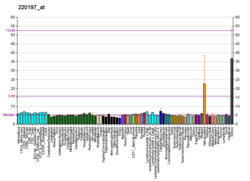Top Qs
Timeline
Chat
Perspective
ATP6V0A4
Protein-coding gene in the species Homo sapiens From Wikipedia, the free encyclopedia
Remove ads
V-type proton ATPase 116 kDa subunit a isoform 4 is an enzyme that in humans is encoded by the ATP6V0A4 gene.[5][6][7]
Remove ads
Function
This gene encodes a component of vacuolar ATPase (V-ATPase), a multisubunit enzyme that mediates acidification of intracellular compartments of eukaryotic cells. V-ATPase dependent acidification is necessary for such intracellular processes as protein sorting, zymogen activation, receptor-mediated endocytosis, and synaptic vesicle proton gradient generation. V-ATPase is composed of a cytosolic V1 domain and a transmembrane V0 domain. The V1 domain consists of three A and three B subunits, two G subunits plus the C, D, E, F, and H subunits. The V1 domain contains the ATP catalytic site. The V0 domain consists of five different subunits: a, c, c', c'', and d. This gene is one of four genes in man and mouse that encode different isoforms of the a subunit. Alternatively spliced transcript variants encoding the same protein have been described. Mutations in this gene are associated with renal tubular acidosis associated with preserved hearing.[7]
Remove ads
Interactions
References
External links
Further reading
Wikiwand - on
Seamless Wikipedia browsing. On steroids.
Remove ads





